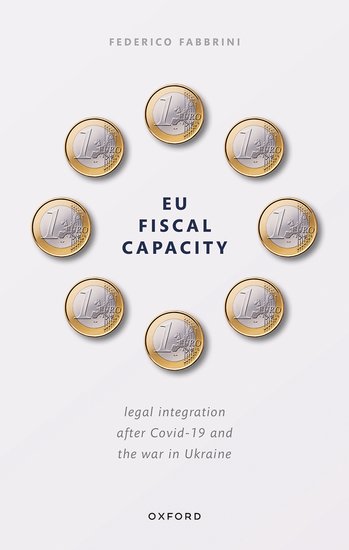By Niels Kirst, Assistant Professor of EU Law at Dublin City University (DCU)
On Wednesday, 8 February 2023, the DCU Brexit Institute was pleased to host the virtual book launch of Prof. Federico Fabbrini’s “EU Fiscal Capacity: Legal Integration After Covid-19 and the War in Ukraine”. The book positively examines the establishment of a fiscal capacity in the EU in response to the Covid-19 pandemic via the Next Generation EU (NGEU) Recovery Fund; and claims normatively that the EU should have a permanent fiscal capacity to address the consequences of the war in Ukraine. It was a high-level event with Prof. Daire Keogh, President of DCU, Giuliano Amato, former Prime Minister of Italy and former Vice-President of the European Convention, and Herman Van Rompuy, former Prime Minister of Belgium, former President of the European Council.
First, Daire Keogh kicked off the debate by highlighting how honoured the University is to host this high-level book launch, reminding the audience that this is already Federico Fabbrini’s eighth book with Oxford University Press (OUP) in eight years, and welcoming the two guests of honour, Herman Van Rompuy and Giuliano Amato.
After the introduction, Herman Van Rompuy followed by talking about the evolution of the Eurozone since the financial and euro crisis, and touting the NGEU as a remarkable success of European integration. Further, he reiterated the creation of the Single Supervisory Mechanism (SSM) in 2013, the first pillar of the Banking Union, which was a big step at the time. He argued that it seems like the EU can only take decisions with a knife at its throat. The NGEU must be seen as a growth mechanism, and it cannot be a temporary measure considering the tremendous challenges ahead for the Union. To cope with the long-term challenges, the EU needs a fiscal capacity that is substantially provided by the Member States. Moreover, he argued that the answer to the United States Inflation Reduction Act (IRA) should not be a national one. Instead, what is needed is a European fund that funnels and supports the European transition into a green future. There is no room for solely national initiatives. However, he noted pointedly that NGEU would have never come about if the United Kingdom (UK) had still been a member state of the EU. He then turned to the topic of enlargement and voiced that enlargement is still vital for the EU. Finally, according to him, the primacy of geopolitics has displaced the primacy of the economy in this phase of European integration.
Third, Giuliano Amato took the stage. He highlighted that extraordinary events are needed to foster European integration, with the NGEU being the response to the unprecedented health crisis of the Covid-19 pandemic. However, the EU cannot go on exception after exception. Instead, the EU needs long-term solutions. He further highlighted the ongoing federalisation of the Union. Eventually, national constitutions need to be changed to accompany those changes. Inevitably, the EU needs more common actions and initiatives to tackle the century-long challenge of climate change.
Shona Murry, a well-known reporter on European events, moderated the discussion between Herman Van Rompuy, Giuliano Amato, and the participants. During the debate, Herman Van Rompuy highlighted that a German-Franco push is needed for any long-term changes in the European Union’s institutional framework. According to Giuliano Amato, further national state aid is not the correct answer to the IRA. On Russia, Herman Van Rompuy highlighted the Western misconception about the Russian Government in the last twenty years. European leaders foolishly trusted Vladimir Putin even though, in hindsight, they should have known better. Finally, on EU strategic autonomy, Giuliano Amato stressed that European solutions are needed for the most recent approaches towards more European autonomy. Finally, the topic turned to the UK and Brexit, as both speakers praised the role and significance of the Brexit Institute in providing continuous coverage of the events in the aftermath of Brexit. Herman Van Rompuy highlighted that the tide is turning, and more and more voices stress that many EU initiatives in the last years would not have been possible with the UK.
Federico Fabbrini rounded out the debate by thanking the guests and presenting his new book. He stressed three main arguments. First, with the NGEU, the EU has developed an actual fiscal capacity. Second, only Brexit allowed the EU to go ahead on this matter. Third, research and education on current EU events, developments and trends are vital for a European public space. Finally, he highlighted that the Brexit Institute would continue the critical coverage of topical European events and developments. Federico Fabbrini’s new book will enlighten many readers about the EU, its new fiscal capacity, and the more significant trends of European integration, thereby fostering the European public sphere.
The views expressed in this blog reflect the position of the author and not necessarily that of the Brexit Institute Blog.



